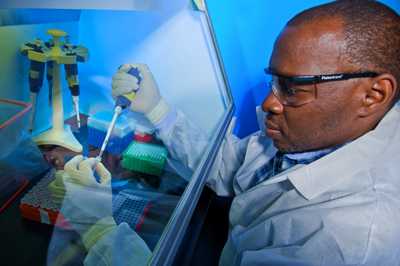AMD Project: Understanding Meningococcal Urethritis
Using AMD to analyze an emerging form of meningococcal disease

CDC researchers will work with a state health department to see why meningococcal urethritis has been on the rise.
In 2015, public health researchers found multiple cases of urethritis caused by Neisseria meningitidis, the bacteria that cause meningococcal disease. Urethritis is an infection that causes swelling and irritation of the urethra (the tube that carries urine from the bladder). It is typically associated with sexually transmitted diseases, like gonorrhea. Meningococcal urethritis is thought to be very rare and very little is known about how it emerged and how it is spread.
To find answers, CDC researchers are turning to AMD to better understand how common meningococcal urethritis is and how it spreads. Scientists will investigate whether it occurs on its own or only when other types of germs are present. Importantly, the project will look to see if the strain causing meningococcal urethritis can also cause the more typical and serious forms of meningococcal disease (bloodstream infections and meningitis).
To do this, CDC scientists will study samples collected by a state health department from people who are sick with urethritis, as well as their sexual partners. Using AMD methods, researchers will test the samples for N. meningitidis and other germs that can cause urethritis. They will then analyze the N. meningitidis DNA and look for changes that could have led it to cause urethritis or to become resistant to antibiotics. They will also look to see if the bacteria gained parts of its DNA from Neisseria gonorrhoreae, the bacteria that cause gonorrhea.
This research will provide information that is essential to understanding meningococcal urethritis. It will also help guide practices to help prevent the disease from spreading further and controlling it when a case is identified.
PRINCIPAL INVESTIGATOR PROFILE
Xin Wang, PhD
Acting Chief, Meningitis Laboratory
Meningitis and Vaccine Preventable Diseases Branch
Division of Bacterial Diseases
National Center for Immunization and Respiratory Diseases

Xin Wang, PhD is the acting chief of the Meningitis Laboratory within the Division of Bacterial Diseases’ Meningitis and Vaccine Preventable Diseases Branch in CDC’s National Center for Immunization and Respiratory Diseases.
In this role, Wang serves as an expert on multiple subjects, including molecular diagnostics, molecular epidemiology, and genetic diversity of vaccine immunogens. She led the development of a breakthrough method for rapidly detecting bacterial pathogens that cause meningitis and threaten the lives of millions of people across Africa’s meningitis belt.
Wang is directing a whole genome sequencing study to identify genetic markers for strains of serogroup W Neisseria meningitidis that have caused epidemics in different parts of the world. By genetically comparing the serogroup W strains currently circulating in Africa to those known to cause outbreaks, scientists will be able to see if the African strains are a serious public health concern. She is also conducting a similar research study to see how different strains of these bacteria are genetically changing now that a serogroup A vaccine was successfully introduced in multiple African countries since 2010.
Wang is a graduate of Shandong University Department of Microbiology and earned her PhD from the Emory University Department of Microbiology and Immunology. In 2014, her contributions were recognized by receipt of the Excellence in Public Health Protection Award and a Special Act or Service Award for laboratory outbreak investigations from CDC’s National Center for Immunization and Respiratory Diseases. She has co-authored more than 40 scientific articles.
- Page last reviewed: March 27, 2017
- Page last updated: March 27, 2017
- Content source:


 ShareCompartir
ShareCompartir